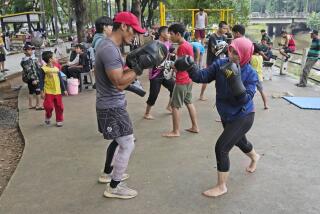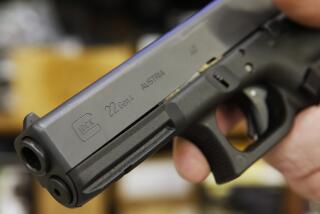S. African Schoolkids Take Defense Into Their Own Hands
- Share via
ATLANTIS, South Africa — A boy calmly approaches a girl, grabs her head with one hand and her throat with the other. The girl thrusts her knee toward the boy’s genitals and pretends to jab him in the eyes with her fingers. As the boy’s knees buckle and he feigns excruciating pain, the classroom erupts in laughter.
“Why is it important to know self-defense?” teacher Menicia Wildeman asks the group of preteens at Protea Park primary school in Atlantis, a hotbed of abuse and crime in South Africa’s Western Cape province.
“To protect yourself,” the kids shout back in unison.
A rise in assaults in schools, including rape, has pressed the national Education Department to join forces with the private agency Crime Busters to launch the “Safe Schools” campaign, which aims to teach girls to defend themselves.
“The level of sexual abuse in our schools we know is exceptionally high, so just having awareness is not enough,” said Martin Prew, the Education Department’s director of school safety.
The program was launched last month in 63 schools in notoriously high-crime areas of South Africa. The government’s goal is to reach 920 schools by August. Some schools, including Protea Park, have been part of a pilot program for the last two years.
Schoolgirls from about age 5 and up are the prime targets of the self-defense program. The girls are taught simple techniques on how to disable an attacker, defend themselves and get away.
South Africa has one of the world’s highest rates of sexual assault, with an estimated 58 child rapes a day and the rape of a woman every 26 seconds, according to statistics gathered by child welfare activists and local rights groups. In January, a report by the Medical Research Council in Pretoria found that a third of all child rapes in South Africa are committed by teachers.
About 21,000 cases of child rape were reported to police last year. But activists say countless other cases go untold.
“The goal is to create awareness against criminal activities and to empower children and women against any form of attack,” said Merlin Hendricks, a program coordinator in charge of the self-defense program for the Western Cape’s Education Department.
At Protea Park, the twice-a-week self-defense classes are part of an overall life orientation course that includes physical education, religion and health matters. About 400 boys and girls, ages 11 to 14, are participating in the program.
Most of them live in the nearby concrete jungle of apartment blocks that have become a breeding ground for gangs and violence. It is a starkly typical feature of Atlantis, a settlement about 35 miles north of Cape Town, which was built in the 1970s to house people classified as “colored” under the former apartheid regime.
“Most of the children come from the flats, and that’s where there is gangsterism, and molestation of small children takes place,” said Wildeman, who was trained to instruct children under the Safe Schools program. “Our children have to walk home. Their parents don’t have a car to pick them up or drop them off. Anything can happen between their house and the school.”
And once in the classroom, they are not immune to assault. A recent survey by an independent researcher in cooperation with the University of the Western Cape found that one-third of all schoolgirls in this province experienced sexual harassment at school. Other abuses are also common.
“[Kids] come in to school with knives and sticks to defend themselves,” said Melvin Losper, Protea Park’s principal. “We teach them to protect themselves with their own body, not with weapons.”
Jerry Oosthuizen, national director of Crime Busters, the group that trains the teachers to instruct self-defense classes, said the techniques are so simple that even a 5-year-old can use them.
The strategy involves a combination of hitting, pushing, pulling and jerking one’s body free. The trainers are loath to give away too many details, lest a potential rapist learn their secrets.
“It’s not about strength,” Oosthuizen said. “It’s not about kicking 40 feet in the air, or throwing a big man over your shoulder. What we want to teach the learners is to get loose and run to safety.”
Girls are also encouraged to avoid walking alone and to wear a whistle.
Losper, Protea Park’s principal, noted a significant decline in the rate of petty assaults at the school in recent months. School officials recorded 23 assaults among students since the start of the year.
“There were a lot of problems in the past with kids attacking each other with pens, scissors, anything they can lay their hands on,” Losper said. “That’s definitely changed. The attitude has changed to ‘think before you act.’ ”
Many students involved in the self-defense program say that being able to protect themselves has boosted their self-esteem.
“I feel more confident,” Protea Park student Bianca Gloete, 11, said during a recent self-defense session. “If someone grabs me around the neck, I would use the tactics that I have learned in the class.”
More to Read
Sign up for Essential California
The most important California stories and recommendations in your inbox every morning.
You may occasionally receive promotional content from the Los Angeles Times.














